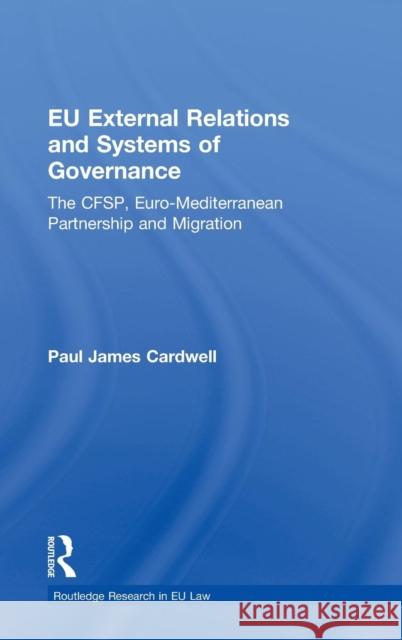Eu External Relations and Systems of Governance: The Cfsp, Euro-Mediterranean Partnership and Migration » książka
Eu External Relations and Systems of Governance: The Cfsp, Euro-Mediterranean Partnership and Migration
ISBN-13: 9780415543804 / Angielski / Twarda / 2009 / 264 str.
Eu External Relations and Systems of Governance: The Cfsp, Euro-Mediterranean Partnership and Migration
ISBN-13: 9780415543804 / Angielski / Twarda / 2009 / 264 str.
(netto: 676,35 VAT: 5%)
Najniższa cena z 30 dni: 701,49
ok. 16-18 dni roboczych.
Darmowa dostawa!
This book takes a fresh look at the external relations of the European Union (EU) and in particular the Common Foreign and Security Policy (CFSP). Rather than focusing exclusively on the competence aspects of the institutions and actors, the book makes the case that the CFSP can be understood as a system of governance, which produces effects beyond the traditional tools associated with foreign policy. The theoretical approach draws on insights from new institutionalism, constructivism and the institutional theory of law and emphasises how the institutionalised forms of cooperation in the external sphere contribute to a social reality in which the 'added value' of the CFSP can be seen. Paul James Cardwell takes the Euro-Mediterranean Partnership (EuroMed) as a case study. Not initially a CFSP project, EuroMed has become the frame for EU foreign policy in the region as an emerging system of governance in which the EU institutions play a central role. Having recently been relaunched as the Barcelona Process: Union for the Mediterranean, it is a topical subject. With the increasing importance of migration on the EU's agenda, the book looks at the relationship between migration, EuroMed and the CFSP and argues that the legal effects of the CFSP can be felt beyond the Treaty-based instruments. EU External Relations and Systems of Governance will be of interest to students and scholars of Law, Politics and European studies researching in the dynamic fields of EU external relations and foreign policy, as well as policy-makers and non-governmental organisations striving to better understand how the EU and its systems of governance operate.
This book takes a fresh look at the Common Foreign and Security Policy (CFSP) of the European Union (EU) as rather than focusing exclusively on the competence aspects of the institutions and actors involved in the EU’s foreign policy, the book makes the case that the CFSP contributes to a system of governance in the EU. Therefore, the CFSP produces effects which go beyond traditional, diplomatic tools associated with foreign policy. The central aim of explaining CFSP as a system of governance is achieved by undertaking an analysis of the CFSP via a theoretical approach which draws on and combines mutually compatible insights from strands of new institutionalism, constructivism and the institutional theory of law. Using these insights emphasises how the institutionalisation of forms of cooperation in the external sphere of governance contributes to a social reality in which the ‘added value’ of CFSP to the EU’s legal order can be seen.
The book takes the Euro-Mediterranean Partnership (EuroMed) as a case study. Not initially a CFSP project, EuroMed has nevertheless become the frame for the EU’s foreign policy in the Mediterranean region by the creation of an emerging system of governance in which the EU institutions play a central role. Having recently been relaunched under the French Council Presidency as the Barcelona Process: Union for the Mediterranean, it is a topical subject. With the increasing importance of migration issues on the policy agenda of the EU and its Member States, and the increasing activities of the EU in managing migration in the Mediterranean, the book looks at the relationship between the spheres of governance in migration and foreign policy (through EuroMed) and argues that the evolution of foreign policy decision-making has resulted in more visible ‘hard’ and ‘soft’ law approaches.
The book will be of interest to students and scholars of Law, Politics and European studies scholars researching in the dynamic fields of EU external relations and foreign policy, as well as policy-makers and non-governmental organisations striving to better understand how the EU and its system of governance operates.











